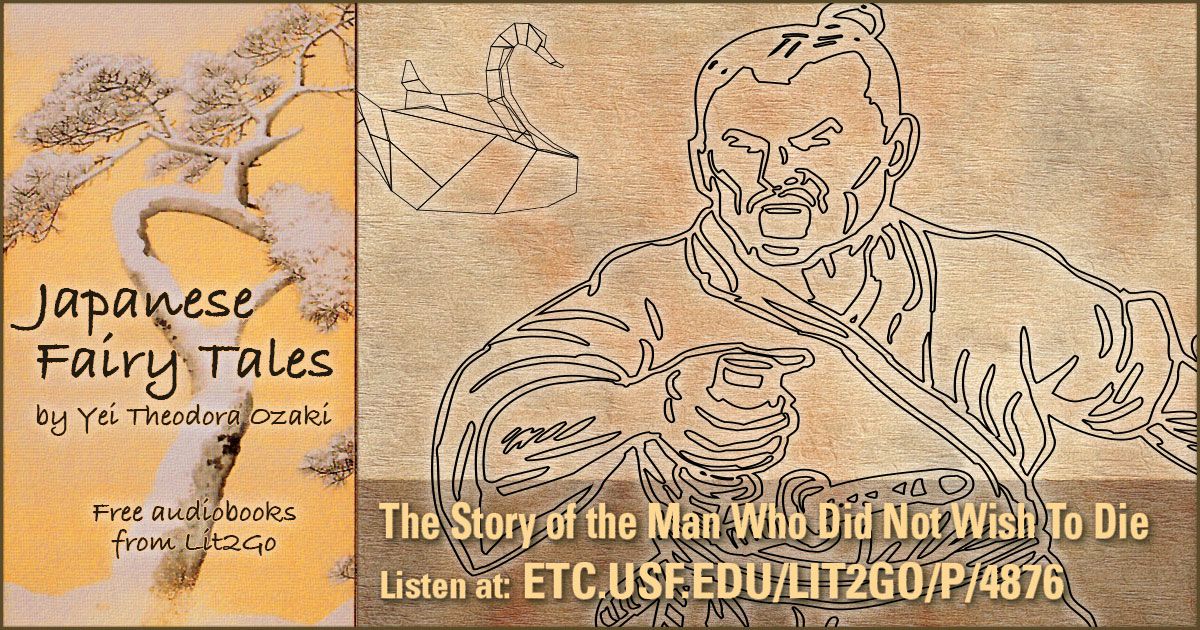Japanese Folktale | The Story of the Man Who Did Not Wish to Die
By:
Folktale Origins: Japan
Retold in Yei Theodora Ozaki's Japanese Fairy Tales (1908), "The Story of the Man Who Did Not Wish to Die" focuses on the dangers of wishing for eternal life and the consequences of achieving it. Sentaro's role, in this folktale, serves as a warning for like-minded readers.

The story started with a thirty-two-year-old idle man called, Sentaro. Inheriting his father's small fortune, Sentaro spent his days wasting away and refusing to work. On a day like any other, Sentaro pondered on his inevitable death. This thought drove him to panic and to seek a solution.
Ideally, Sentaro wanted to live until he was at least five or six hundred years old. Using his knowledge of history, he recounted previous emperors and princesses, whose lives spanned hundreds and thousands of years. One emperor, in particular, caught his attention.
The Chinese King, Shin-no-Shiko, had the same exact fears as poor Sentaro. He too wished for eternal life. As one of the most prominent kings in Chinese history, Shin-no-Shiko had access to everything except for freedom from his fear of death. Thus, he searched for...the Elixir of Life.
Shin-no-Shiko summoned his trusted advisors. An old courtier by the name of Jofuku spoke of a mystical land, Horaizon, where a group of hermits lived and stored the Elixir of Life. Upon hearing of this great news, Shin-no-Shiko sent Jofuku off with the nicest vessel to sail on.
Although Jofuku never returned, the old courtier, to this day, is worshipped as a patron god. After recalling this story, Sentaro vowed to reach Mount Fuji, the home of the hermits, and achieve eternal life by drinking the Elixir of Life. Leaving home, Sentaro set off to the mountains.
Upon futilely wondering, Sentaro stumbled upon a hunter, who told him that there were no hermits living anywhere in the mountains. The only humans were the two of them and a group of bandits. Disappointed, Sentaro left Mount Fuji and went to Jofuku's shrine in the south of Japan.
Sentaro prayed to Jofuku for seven days, and on the seventh night, Jofuku appeared above him, standing on a cloud. With no time to waste, Jofuku rebuked Sentaro, stating that Sentaro wasn't fit for the life of a hermit – or eternal life. Sentaro, not so surprisingly, was so accustomed to luxurious living that he couldn't achieve this state even if he tried.
Instead, Jofuku offered a different type of assistance in the form of a paper crane. This paper crane was no ordinary paper crane, as it grew large enough for Sentaro to ride on its back. Upon settling on the paper crane's back, Sentaro was lifted into the sky across the seas for miles.
Thousands of miles later, Sentaro (via the paper crane's transport) arrived at the country of Perpetual Life, a place where no one died. Excited as can be, Sentaro toured the country, noticing the land's level of prosperity. In no time at all, Sentaro decided to settle down there.
Everyone was welcoming, and Sentaro was even able to set up a shop. More and more, Sentaro noticed oddities about this land: Travelers from India and China came to "Paradise" to sell poisons and other "medicines" that would shave off the residents's lives. Strangely, the residents sought out these deadly poisons eagerly, as if they were drinking the Elixir of Life.
According to the villagers, they had lived so long in contentment that they actively sought death. Unlike Sentaro who wanted eternal life, these people wanted death's bliss. Time after time, the wealthy poured money into poison and other cosmetic items that would turn their hair gray.
For a while, Sentaro was the happiest man in Paradise...until many years passed by. Several smaller annoyances turned into unlivable conditions, as Sentaro spent three hundred years toiling away at work with zero change to his life. Like everyone else in Paradise, he grew weary.
Now, Sentaro actively wished to return to his old life. The paper crane, which had stayed in the same condition as three hundred years ago, grew to a grand size. Sentaro boarded the paper crane's back and headed across the seas. However, Sentaro hesitated, grieving the things that he had left behind in Paradise. He actively tried to pull the paper crane off course but failed.
Instead, a violent storm formed over the ocean and caused the paper crane to crumple and crash. Sentaro dropped into the belly of the sea. He desperately cried out for Jofuku to save him from death, but there was no response. Eventually, the seawater threatened to drown him, and a humongous shark with an open mouth approached him.
As he screamed out to Jofuku for a final time, Sentaro awakened back in Jofuku's shrine. During his prayer session, Sentaro had fallen asleep. The three hundred years in Paradise, he realized, was all but a bad dream. A messenger, however, appeared before Sentaro with Jofuku's words.
Similar to his previous rebuke, Jofuku's message stated that eternal life wasn't meant for Sentaro. Instead, Sentaro should spend the rest of his life building a prosperous family, praying to his ancestors, and planting the seeds for his future children. Additionally, Jofuku had sent a book for Sentaro to use to guide him on his new path.
As soon as the messenger disappeared, Sentaro returned home. Using the gifted book, Sentaro followed its teachings, creating a good life for himself and his family. In the end, Sentaro's focus on his present life ensured the prosperity of his household.
Bạn đang đọc truyện trên: AzTruyen.Top